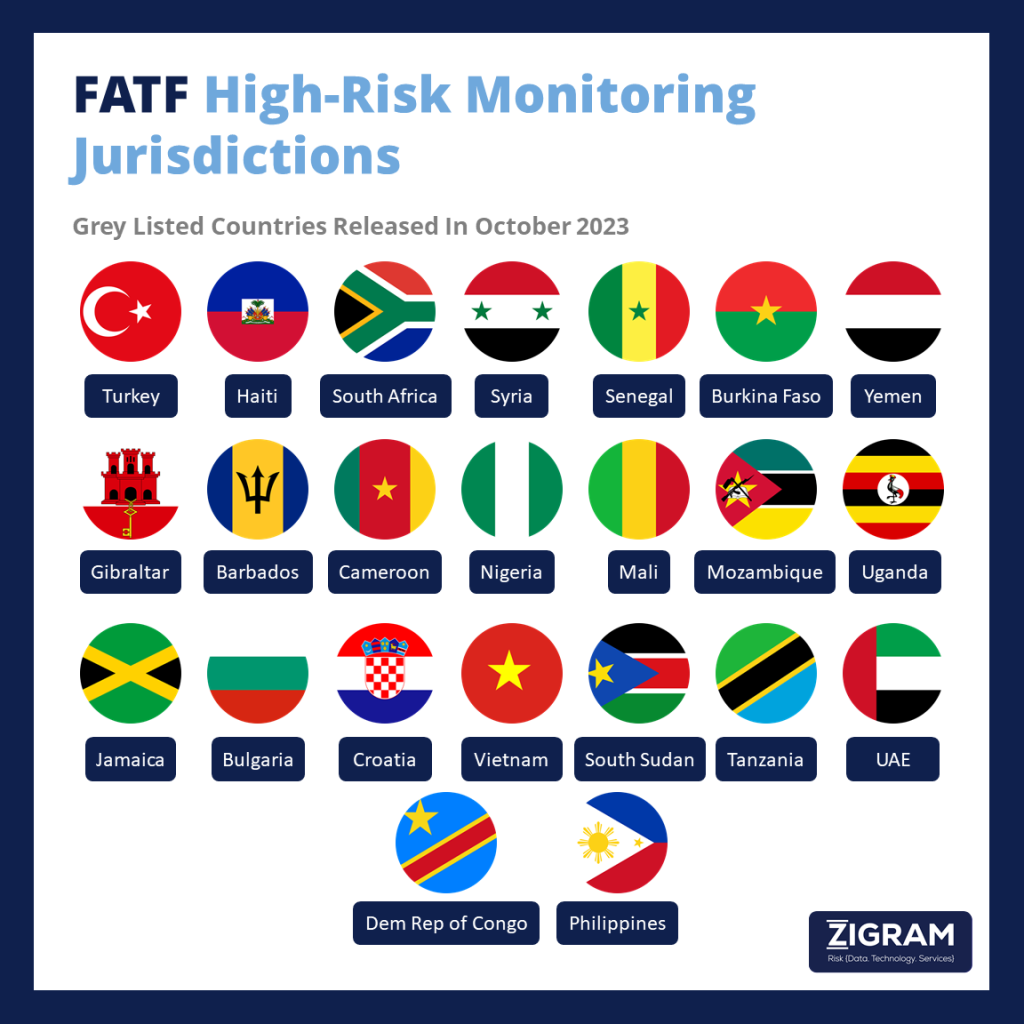- 7 minutes read
Is UAE Set to Exit the Grey List? Read About Its Success in Achieving FATF Compliance!
In a significant development for the United Arab Emirates (UAE), reports in October 2023 indicated that the UAE was on the verge of being removed from the Financial Action Task Force (FATF) “grey list.” This move comes as a result of the UAE’s substantial efforts to implement compliance reforms in the areas of anti-money laundering (AML), counter-terrorist financing (CTF), and anti-proliferation financing.

Understanding the FATF Grey List:
The FATF, an intergovernmental organization committed to combating money laundering and terrorist financing, maintains a “grey list” of jurisdictions under increased monitoring. Countries on this list actively work with the FATF to address weaknesses in their financial systems. Being grey-listed signals a country’s commitment to resolving identified issues and subjects it to increased scrutiny.
FATF Grey Listing Conditions:
The conditions for being placed on the FATF grey list generally include:
Inadequate Legal Framework:
- Lack of comprehensive and effective legislation to address money laundering and terrorist financing.
- Weaknesses in laws and regulations related to customer due diligence, suspicious transaction reporting, and asset freezing.
Deficient Implementation:
- Inadequate implementation or enforcement of existing laws and regulations.
- Limited or ineffective supervisory and enforcement capabilities.
Lack of International Cooperation:
- Insufficient cooperation with other countries in investigating and prosecuting money laundering and terrorist financing activities.
- Failure to establish and maintain effective mechanisms for exchanging information at the national and international levels.
Non-Compliance with FATF Recommendations:
- Failure to fully align with the FATF Recommendations and standards.
- Lack of progress in addressing deficiencies identified in mutual evaluations.
Terrorist Financing Concerns:
- Inadequate measures to combat the financing of terrorism.
- Weaknesses in identifying and freezing assets associated with terrorist organizations.
Political Will and Commitment:
- Lack of political will or commitment to address the identified deficiencies and implement necessary reforms.
Transparency and Beneficial Ownership:
- Lack of transparency in beneficial ownership information.
- Inadequate measures to prevent the misuse of legal persons and arrangements for money laundering and terrorist financing.
Current FATF Grey Listed Countries:
FATF after working with the local and international agencies releases various evaluation reports which are then used for classifying countries into grey lists. The following countries are currently on the grey lists and are required to work on their AML/CFT laws:

Impact of Being on the Grey List:
The consequences of being on the FATF grey list are substantial.
- Restrictions on cross-border transactions
- Hindered foreign investment
- Reduced market liquidity
- Challenges in accessing credit
- Potential government borrowing issues are among the economic impacts.
A jurisdiction may be removed from the grey list if significant improvements are made. However, failure to address the deficiencies may lead to further consequences, including potential inclusion in the FATF blacklist, which entails more severe measures and restrictions. Therefore, the successful exit from the grey list is crucial for the UAE's economic stability and financial integrity.
Why Was the UAE on the Grey List?
The UAE found itself on the FATF grey list in March 2022 following the release of the Mutual Evaluation Report (MER) in April 2020. Despite acknowledging the UAE’s strengthened legal framework, the report emphasized the need for the country to urgently address criminal financial flows, given its status as a global financial center and trading hub. The report identifies supervision issues in some higher-risk sectors, such as banks, the Dubai property market, dealers in gold and precious metals, and hawaladars, within the UAE’s extensive and diverse financial and non-financial sectors. The risks are substantial, stemming from the UAE’s extensive financial, economic, corporate, and trade activities, including its leadership in oil, diamond, and gold exports. The strategic geographical location, proximity to conflict zones, and the jurisdictional complexity of seven Emirates, two financial free zones, and 29 commercial free zones further heighten the country’s risk of attracting funds linked to crime and terrorism.
UAE's Commitment to Reforms:
Since its grey-listing, the UAE has demonstrated an unwavering commitment to enhancing its AML/CFT compliance. The Third Enhanced Follow-Up Report in July 2023 highlighted significant progress, with the FATF recognizing the UAE as “compliant” with 15 recommendations, “largely compliant” with 24, and “partially compliant” with one. Notable improvements include the re-rating of Recommendation 1 from Partially compliant to Largely compliant, Recommendation 19 from Partially compliant to Compliant, and Recommendation 29 from Partially compliant to Compliant. Key reforms included improving understanding of money laundering risks, mitigating the misuse of legal entities, increasing mutual legal assistance requests, and bolstering the capacity of the Finance Intelligence Unit.
UAE’s Progress Report:
The United Arab Emirates (UAE) has demonstrated an ongoing commitment to enhancing its Anti-Money Laundering (AML) and Counter-Terrorist Financing (CTF) response, with progress reported since October 2023. Notable achievements include an improvement in the Corruption Perception Index ranking from 27th to 26th, with a score increase from 67 to 68. The UAE Financial Intelligence Unit (FIU) Annual Report for 2022 revealed significant strides, including a 96% increase in Suspicious Transaction Reports (STRs) and a 55% rise in Suspicious Activity Reports (SARs), totalling 38,912.
Key areas of focus for the UAE’s FIU and law enforcement agencies are terrorism finance, proliferation finance, trade-based money laundering (TBML), money laundering of international proceeds, professional money laundering, fraud, and funds available in the UAE that can be frozen. The FIU played a crucial role in disseminating 212 cases to law enforcement in 2022, involving 2,543 reports, with a conversion rate of 6.5%.
Substantial fines and penalties were imposed on financial institutions and designated non-financial businesses and professions (DNFBPs), amounting to AED199 million for H1 2023 and AED 249 million for January to October 2023, exceeding the combined totals of the preceding years. Additionally, the UAE’s efforts in combatting money laundering and terrorist financing led to 583 related cases opened between January and October 2023, resulting in the confiscation of AED 5.4 billion (USD 1.47 billion), representing 8.3% of the estimated proceeds of crime.
Furthermore, the UAE has actively cooperated internationally, responding to 3,061 requests for assistance in extradition or thwarting criminal activities related to money laundering and terrorism financing since 2020. Notably, 899 criminals were extradited, including 43 involved in money-laundering crimes, with 10 linked to terrorism or financing terrorist activities. Overall, the UAE’s comprehensive AML/CTF efforts reflect a substantial increase in awareness, reporting, and enforcement activities.
Key Reforms Highlighted by FATF:
FATF’s announcement in October 2023 outlined several key reforms implemented by the UAE. These included:
- Enhancing understanding of ML/TF risks
- Implementing risk-based measures to prevent misuse of legal entities
- Increasing mutual legal assistance requests
- Allocating additional resources to the Finance Intelligence Unit
- Strengthening enforcement of targeted financial sanctions.
Importance of Exiting the Grey List:
The removal of the UAE from the FATF grey list holds significant economic implications. It paves the way for the UAE to overcome restrictions on cross-border transactions, attract foreign investment, improve market liquidity, access credit more easily, and ensure smoother government borrowing processes. The ongoing commitment to reforms is crucial for maintaining compliance and safeguarding the UAE’s financial standing globally.
As the UAE prepares to exit the FATF grey list, it marks a commendable achievement for the country in strengthening its AML/CTF framework. The successful implementation of reforms not only signifies the UAE’s commitment to global financial integrity but also bodes well for its economic stability and attractiveness to international investors. The upcoming FATF Plenary in February 2024 is anticipated to formally remove the UAE from the grey list, marking a significant milestone in the country’s journey towards financial compliance.
- #UAE
- #FATF
- #Grey_List
- #Governance
- #Compliance






